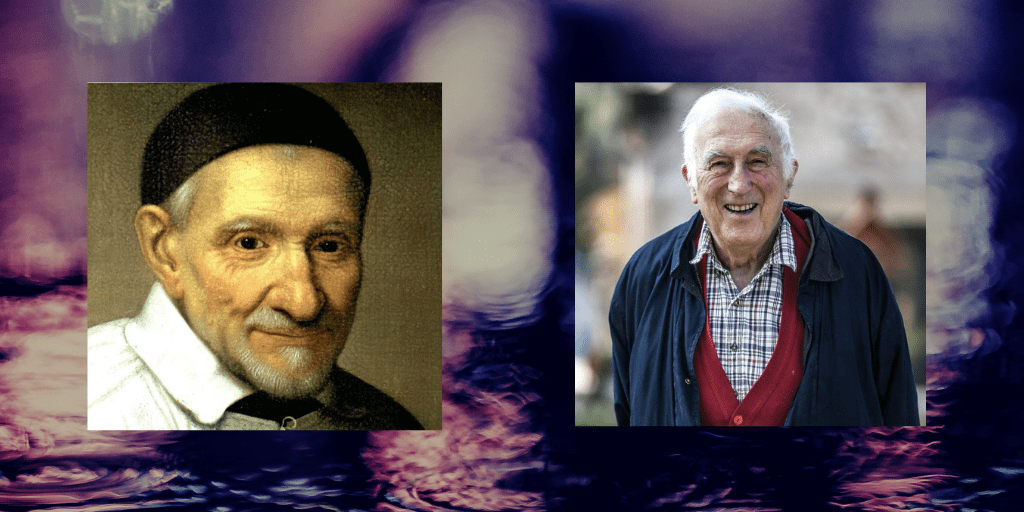These two giants did not know each other. But they were each giants in bringing about major changes in attitudes in the worlds in which they lived. St. Vincent dared to call the poor his Lords and Masters!
In one sense, Jean Vanier’s heart may have stopped beating recently. But in another sense, he is still very much alive in what he taught us and in the hearts of an international federation of communities in 37 countries known as the L’Arche movement—French for “The Ark”.. (For more information about just what he accomplished visit the Wikipedia article.)
Jean Vanier (1928 – 2019)
Jean Vanier was born into a family with prestige and prominence in Canadian society. Yet he found himself learning with and from the least.
In his own words
- “Every person, and in a special way the beggar and one who is vulnerable and rejected, is precious to God and can lead us to God”
- To love people with learning disabilities is not about doing things for them, but about revealing to each person that they are more beautiful and precious than they dare to believe.
- Assistants frequently come to our communities to “do good” to those who are weak. They have been formed by our cultures to be strong, knowledgeable, successful, and to climb the ladder of promotion. When they come to L’Arche, however, they discover that they are being invited to learn not to be a success, but to love; to create relationships of love and friendship with people who are at the bottom of the ladder of society, who are the most vulnerable and weak.
- People with learning disabilities are obviously transformed as they discover that their deepest self is accepted and loved. So, too, are assistants transformed. God’s salvation returns us to ourselves in this way.
Do you hear echoes of St. Vincent in being evangelized by those we serve?
In the eyes of others
Jean Vanier’s experience and vision were the inspiration for King’s University College professor Pamela Cushing to found the Western affiliate college’s Disabilities Studies program, She writes:
- “As a person, I learned that listening to someone is the most important thing you can do with them – real listening or ‘presence’ as Jean would call it. All the tasks we busy ourselves with to show people our love are fine. But in today’s rushed world, just being with them is vital and life-giving. Give them the gift of your whole presence,”
- In two decades of working in his orbit, I witnessed the power of focusing on the path forward instead of dwelling on the problems and critiques.
- He was open both to new questions and answers, but unflinching in his conviction people look at disability through a different lens. “He could admit his own fragility, his own not-knowing. But he would always say, ‘Life is fragile. But that is not a reason not to do something decent with your life. You matter to someone. It makes a difference that you live and have lived.’”
- He realized his radical idea of mutuality was often challenging and risky, yet he forged ahead, she said.“For Jean, the fragility of a project, or the imperfectness of his solutions at that moment, did not justify stasis. He would choose the path of imperfect-but-courageous action over doing nothing.”
- “Keep creating space to discuss the treasures we’ve all discovered in living with people with intellectual disabilities. Keep everybody talking, talking and listening to what people can learn when they’re having these genuine encounters.”
Mother Teresa’s observation… and a question
“Don’t come to Calcutta to be Mother Teresa; be Mother Teresa where you live.”
What is it that keeps us from being Jean Vanier where we are, whether it is in direct ministry or working quietly toward being the change we want?
by John Freund, CM
https://vincentiansusa.org


